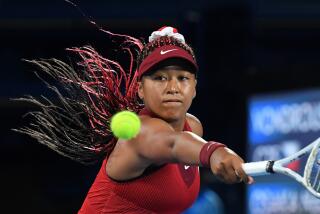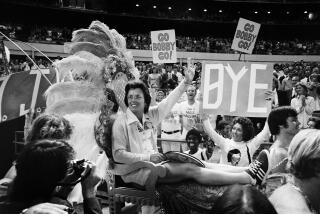Tennis : Navratilova Admits She Is No Match for Men
- Share via
NEW YORK — In terms of entertainment, the match was a dud. And in terms of impact, the match didn’t carry one-tenth of the significance of Billie Jean King’s 1973 “mixed singles” victory over Bobby Riggs.
But the Aug. 23 doubles Challenge match in Atlantic City was good for one thing. It may have finally brought an end to the biggest pseudo-controversy in sports: Can women tennis players compete with the men?
This is a question that should not rank as one of the world’s great mysteries in the year 1985. Everyone knows what would happen in a game of one-and-one between Michael Jordan and Cheryl Miller. Everyone knows how Carl Lewis would fare in a sprint against Evelyn Ashford.
Why should the thinking be any different in tennis?
Last year, Martina Navratilova bristled at the suggestion made by Vitas Gerulaitis that she wouldn’t stand a chance against the world’s No. 100-ranked men’s player. That, eventually, helped spawn “The Challenge!” 12 months later.
But now, even after teaming with Pam Shriver to win “The Challenge!,” Navratilova has conceded the obvious.
“I know I would lose to a man,” she says. “Mike (Estep), my coach, still beats me. There’s no way for me to compete. The men are quicker, stronger. I take it as a compliment that people even wonder how I would do.”
If Navratilova could pick the opponent and the surface, she said she might be able to beat a man “maybe one of 10, one out of 20 times.”
Navratilova said: “Maybe if I played someone like Harold Solomon, I’d have a chance. He’s not overpowering and he stays back. But if I played Steve Denton, who’s not as good a player as Solomon, I’d lose because he has such a strong serve. I couldn’t get it back very much.”
The great misconception about “The Challenge!” was that it might actually serve as a legitimate proving ground for the sexes.
Wrong, on two counts.
First, it was a doubles match, not a one-on-one competition. The strategy is different in doubles, weaknesses can be more easily masked and stamina is not nearly so critical a factor. Also, if three of the players on the court are of reasonably equal talents but the fourth is significantly below their level, the team with the weaker player is going to lose 99% of the time.
Which brings us to Point B: Bobby Riggs.
Basically, Riggs amounted to a 67-year-old ball-and-chain shackled to the ankle of Gerulaitis. Riggs couldn’t serve, couldn’t return serves, couldn’t hit overheads with any amount of force. Older than the combined ages of Navratilova and Shriver, Riggs was painfully out of place in this match. Even John McEnroe, on his finest day, would be an underdog against Navratilova and Shriver if Riggs were his partner.
Now, it would be different if Navratilova had agreed to a singles match against Gerulaitis. Or, even the No. 100 men’s player, currently Jay Lapidus.
Navratilova has been approached with similar offers. “The price hasn’t been right,” she said with a grin. “Maybe near the end of my career, I’ll consider it . . . if I’m in trouble with the IRS.”
Until then, we should be free from more Battle of the Sexes hustles.
Or will we?
Riggs’ personal coach, Lorne Kuhle, said before “The Challenge!” that “if we lose with Vitas, we’re going to upgrade and get Connors for a rematch next year.”
If so, we’ll know one thing for sure: P.T. Barnum definitely was right.
Now, a Few Words From Mac: Like him or loathe him, John McEnroe always has something to say. A sampling from McEnroe’s first week at the U.S. Open:
--On the grass courts at Wimbledon: “It’s not tennis anymore. You get a guy like (Kevin) Curren or (Boris) Becker, a big server, and it becomes a one-shot deal. It’s not going to happen in my career, but Wimbledon is going to have to change (surfaces). Otherwise, you’ll have 16 Beckers in the round of 16. Who wants to see everybody ace everybody else? They shouldn’t keep things the same just because of the fact they have been there in the past. Players are different, stronger, today. In basketball, if players started to grow to 7-6 and could dunk standing on their feet, wouldn’t you expect them to do something?”
--On Curren’s “I hate New York and that’s why I lose” routine: “He’s right. He’s not going to win a thing (here) with that type of thinking. What I recommend for him: He doesn’t have to stay in the city. I prefer to stay on the island during the Open and rest and get ready for my matches.”
--On giving up doubles: “I’ve retired from doubles. It was taking too much time away from me and I was playing badly (in singles). I can’t handle not playing 100%. This type of match (McEnroe’s first-round scare against Shlomo Glickstein) is a good example. Just for a couple of years, I’m going to concentrate on other things.”
More to Read
Go beyond the scoreboard
Get the latest on L.A.'s teams in the daily Sports Report newsletter.
You may occasionally receive promotional content from the Los Angeles Times.










